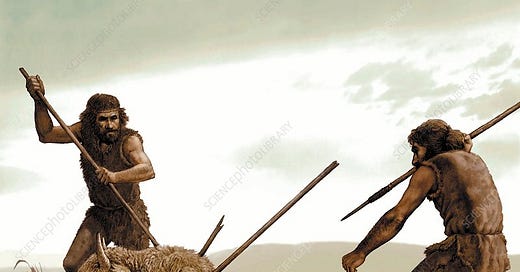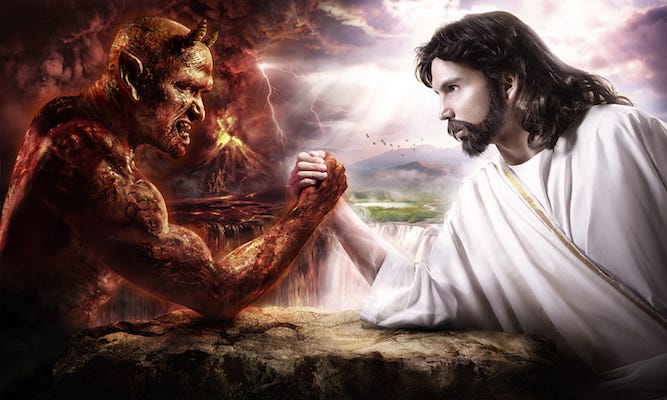Politics is a weird word. It reminds most of us of election season, and Capitol Hill, and maybe the DMV. Originally, of course, it was just a bunch of people living in a community making the inevitable decision to let some people be in charge. Those people were, for our purposes, “a government,” and maybe their jobs included staying up late to wag spears at bison or distributing evenly the tribe’s haul of wild berries. Those people were probably chosen because they were best suited for the job by virtue of brains, brawn, or circumstances.
The people sleeping under a handmade palm leaf shelter thought “the government” (their “elected officials”) might save them from wild goats, sure, but they didn’t think those people would save them in any sort of existential or spiritual sense. They probably thought something like, “I’m sure glad Dan keeps watch all night because Lord knows I need my beauty sleep.” But Dan was just another guy (definitely a guy) who the rest of the clan had probably seen pooping behind a bush.
Originally the word politics came from the word for city. It was just a way of thinking about how choices would be made in a place where lots of people lived together. If you’ve ever lived in a family or taught in a classroom or had a job, you know that once a group of humans gets to a certain size, it doesn’t work to have everyone in charge. So, okay, let Dan do it.
In the 21st century, politics is a word as abstract as love or glory or “the cloud.”1 The concept of politics is steeped in mythology and emotion and the baggage of history. The practicalities of politics are sustained by money and inextricable from power.
I’m no social scientist, but all this abstraction seems a logical result of—among other things—(a) the literal size of our country and (b) the vast size (more figuratively) of our “world.” The administration / Folks-in-Charge / “government” once dealt with only immediate threats, like who got to take Bob’s wife after Bob was eaten by a woolly mammoth or who was going to share a mud hut after Sharon’s was toppled by a hurricane. Obviously do not check the science or history here. What matters is that not only were the threats tangible and immediate, “the government’s” decisions were in service of people Dan knew intimately.
While the government was undoubtedly still rife with scandal and betrayal, Dan’s constituents weren’t likely lying awake at night wondering if Dan was ever going to make them happy, give their lives meaning, or once-and-for-all solve the (existential) problem of hunger itself. I’m spitballing here, but I think they just wanted Dan to scare the bison and get them their fair share of blueberries.
In 2022, though, our “Dan” (poor Dan) has to think of everyone—all over the place and extending both backward and forward in time. He also needs to consider the institutions we’ve created and the lobbyists and billionaires with their money. Dan even has to consider the animals he once would have been happy to stab in the heart and roast on a spit. Furthermore, he has to think about cell clusters that our original Dan had no idea existed because that guy thought infant births were the result of a waxing gibbous moon. (Again, spitballing.)
Modern politicians are mostly the worst, so you don’t have to sympathize with them. It’s just that even an imaginary, wonderful, superhuman group would have a nearly impossible task governing a nation today. I have four kids, and I can’t make even half of them happy at one time. No matter what I decide, someone is always pouting in the corner.2
And I think it’s helpful to occasionally remind ourselves how and why this all started so we don’t get the idea that politics actually is an abstraction. Politics is decision making on behalf of a large group of people. It started as a means to an end, not an embodiment or expression of morality or meaning.
In 2022 “politics” is larger and more complex and in many ways inextricable from the way we live, but essentially, it’s just a bunch of Poop-in-a-Bush Dans. Some politicians are virtuous; some are rotten; most are in between.
It seems to me that one risk of abstracting government is that it gets tangled up with all the other abstractions we face in 2022: big tech, social media, big banking, animal rights, what love is and is not.3
And other abstractions like good and evil.
If political parties are nebulous entities, and government is an abstract network in control of our lives, it’s too easy to jumble these abstractions. Too easy, for example, to align one political party with good and one with evil.
Of course both parties think they are the ones with the values and the other party utterly lacks morality. (A poorly drawn sketch: All we Republicans want to do is save innocent babies, while those Democrats are perverse and godless. All we Democrats want to do is help marginalized groups rise, while those Republicans are greedy bigots.)
It helps to broaden one’s circle a bit, so that you know both Republicans and Democrats who are good and earnest and really trying to make things better. If you don’t know at least three lovely humans who disagree with you, you know only a caricature of your enemy. I can think of few things more dangerous than thinking you know actual people with discernible motives but actually only knowing a stereotype with assumed motives.
What I think both Republicans and Democrats get wrong is conceptualizing the government as The Thing That Will Save Us. We all sort of have this sense that something ought to save us, I think, or at least that something is a little wrong with the world and needs fixing.
Having taken center stage thanks to the internet and 24/7 news, politics (sometimes passively and sometimes very actively) offers itself up as the institution or concept that might help us find a way out of the mess we’re in. The bigger the mess, the more we want and consider rescue.
Diehard Republicans and Democrats think the same thing: that the saving is going to happen when the government finally imposes their [fill in political party of choice] values on the rest of the country. (Yes! I think both groups have values.)
But like, it’s just a bunch of Dans.
I don’t think politics will “save us,” and that’s as much for practical reasons as theological ones. Of course the Dans aren’t doing what I want them to do. We don’t live our lives the same way or care about the same things. The Dans are incentivized by power, and I have little.
When I feel disappointed by the government, I think something more along the lines of “yes, okay, Dan sucks” or “well that was an unsolvable problem to begin with” than “LORD HELP US WHAT DO WE DO NOW.” If you’re tempted to accuse me of inaction or resignation, remember that, in my understanding, relinquishing the concept of a salvific government frees me toward, not away from, further action.
literally where are my pictures going
This despite the fact that I intimately know and love my children. Today’s Person-In-Charge doesn’t even know you.
I am by no means implying that these things do not have practical consequences, only that they are sometimes hard to think about in particular terms.







Yes. Every American, all of us tempted to outsize our politics, would do well to read The Righteous Mind (Haidt) and How to Think (Jacobs). Also, this is really vivid - and funny. Dan is somehow the perfect name for a Paleolithic president.